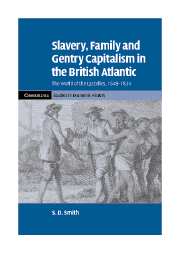 Slavery, Family, and Gentry Capitalism in the British Atlantic
Slavery, Family, and Gentry Capitalism in the British Atlantic Published online by Cambridge University Press: 17 July 2009
The prosperity of the English sugar colonies has been, in a great measure, owing to the great riches of England, of which a part has overflowed, if one may say so, upon those colonies.
In Wealth of Nations, Adam Smith marvelled at the speed with which the English-speaking colonies in the Americas had developed since their first settlement. Yet, he insisted, ‘The progress of our North American and West Indian colonies would have been much less rapid, had no capital but what belonged to themselves been employed in exporting their surplus produce.’ In Smith's eyes, the dependence of colonial expansion on capital exported from Britain was potentially dangerous. While conceding that it might be advantageous for developing regions to borrow from more advanced countries, he regarded it as unnatural for colonies to be restricted, as they were under the navigation system, to a single metropolitan creditor. Such a relationship, Smith concluded, had distorted Britain's trade and manufacturing and left her vulnerable to colonial trade boycotts. ‘In her present condition’, he warned, ‘Great Britain resembles one of those unwholesome bodies in which some of the vital parts are overgrown, and which, upon that account, are liable to many dangerous disorders scarce incident to those in which all the parts are properly proportioned.’
More than forty years ago, the question of capital and colonisation was addressed by Richard Pares in his posthumously published Merchants and Planters.
To save this book to your Kindle, first ensure [email protected] is added to your Approved Personal Document E-mail List under your Personal Document Settings on the Manage Your Content and Devices page of your Amazon account. Then enter the ‘name’ part of your Kindle email address below. Find out more about saving to your Kindle.
Note you can select to save to either the @free.kindle.com or @kindle.com variations. ‘@free.kindle.com’ emails are free but can only be saved to your device when it is connected to wi-fi. ‘@kindle.com’ emails can be delivered even when you are not connected to wi-fi, but note that service fees apply.
Find out more about the Kindle Personal Document Service.
To save content items to your account, please confirm that you agree to abide by our usage policies. If this is the first time you use this feature, you will be asked to authorise Cambridge Core to connect with your account. Find out more about saving content to Dropbox.
To save content items to your account, please confirm that you agree to abide by our usage policies. If this is the first time you use this feature, you will be asked to authorise Cambridge Core to connect with your account. Find out more about saving content to Google Drive.